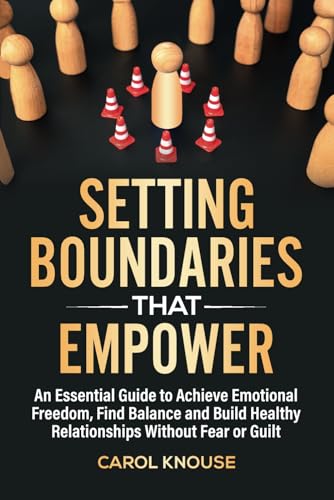To set gentle boundaries with family, communicate your needs clearly and kindly, using “I” statements to express how certain topics or behaviors affect you. Stay consistent and respectful, reinforcing your limits without blame or confrontation. Focus on maintaining your emotional health while fostering mutual respect. Show empathy and listen actively, ensuring your boundaries are understood and honored. If you keep these strategies in mind, you’ll find it easier to create healthier, balanced relationships.
Key Takeaways
- Communicate your boundaries honestly and kindly using “I” statements to express your feelings.
- Be consistent and firm to reinforce your limits while maintaining respect and understanding.
- Focus on creating a balance that protects your emotional well-being without excluding family members.
- Use respectful language and active listening to foster mutual respect and clarity.
- Reinforce boundaries gently but firmly to prevent confusion and promote healthy relationships.

Have you ever felt overwhelmed by your family’s expectations or boundaries? It’s common to feel caught between honoring your loved ones and protecting your own well-being. Setting gentle boundaries is about creating a balance, and that starts with understanding emotional boundaries. These are the limits you set to protect your emotional health and maintain a sense of control. You don’t have to shut family members out, but you do need to be clear about what you’re comfortable with and what isn’t acceptable. For example, if certain topics trigger stress or discomfort, it’s okay to steer conversations away or politely decline to discuss them. Establishing emotional boundaries isn’t about being confrontational; it’s about respecting your feelings and communicating that respect to others. Using clear and respectful communication techniques can help reinforce these boundaries effectively. Effective communication strategies are key to making these boundaries work. When you approach your family, aim for honesty and kindness. Use “I” statements to express your needs without sounding accusatory. For instance, “I feel overwhelmed when I’m asked about my personal decisions, and I’d appreciate some space to process things on my own.” This approach shifts the focus to your feelings rather than blaming others, which helps prevent defensiveness. Be consistent in your messages—if you set a boundary today, stick to it, so your family understands that your limits are important. At the same time, listen actively when they share their concerns. Showing empathy and understanding can foster mutual respect, making it easier to maintain boundaries without damaging relationships.

Setting Boundaries That Empower: An Essential Guide to Achieve Emotional Freedom, Find Balance and Build Healthy Relationships Without Fear or Guilt
As an affiliate, we earn on qualifying purchases.
As an affiliate, we earn on qualifying purchases.
Frequently Asked Questions
How Do I Handle Family Members Who Ignore My Boundaries?
When family members ignore your boundaries, stay calm and practice respectful communication. Clearly restate your limits, emphasizing your emotional resilience and need for respect. If they continue disregarding your boundaries, reinforce them by limiting interactions or taking a break. Remember, your well-being matters, and setting consistent, gentle boundaries helps others understand your needs. Over time, this approach fosters healthier relationships built on mutual respect.
What if My Family Reacts Negatively to My Boundary-Setting?
When your family reacts negatively, it’s ironic—they’re testing your emotional resilience, after all. Stay calm, using gentle communication strategies to express your feelings clearly. Remember, their reaction isn’t a reflection of your boundaries but of their own resistance. Stand firm but kind, and give them space to process. Over time, consistent kindness and patience will help them see boundaries as an act of care, not rejection.
How Can I Maintain Boundaries Without Feeling Guilty?
You can maintain boundaries without feeling guilty by building emotional resilience and reminding yourself that setting boundaries is healthy. Enforce them consistently and kindly, understanding that your needs matter. When guilt arises, acknowledge it without letting it overpower your reasons for boundary enforcement. Practice self-compassion, focus on your well-being, and remember that maintaining boundaries helps foster respectful relationships, ultimately benefiting everyone involved.
Are There Cultural Considerations When Setting Family Boundaries?
Yes, cultural norms and family expectations influence how you set boundaries. You should consider these factors to guarantee your boundaries are respectful and effective. Adapt your approach by acknowledging traditions while gently communicating your needs. By showing appreciation for cultural values and explaining your reasons calmly, you help your family understand your perspective, making it easier to establish healthy boundaries without causing offense or guilt.
How Do I Rebuild Trust After Establishing Boundaries?
To rebuild trust after setting boundaries, focus on consistent, honest communication and demonstrate respect for your family’s feelings. Practice trust repair by being reliable and transparent, showing you’re committed to emotional healing. Apologize sincerely if needed, and give it time; trust takes patience. By maintaining these efforts, you create a safe space for emotional healing, gradually restoring the bond and fostering mutual understanding.

Crucial Conversations: Tools for Talking When Stakes are High, Third Edition
As an affiliate, we earn on qualifying purchases.
As an affiliate, we earn on qualifying purchases.
Conclusion
Remember, like Atticus Finch teaching Scout about understanding others, setting gentle boundaries helps you foster respect and compassion within your family. It’s not about building walls but creating a safe space where everyone feels heard. As you practice kindness and clarity, you’ll find that boundaries become bridges, not barriers. Embrace this journey with patience and love, knowing that just like a gentle stream shapes the land, your boundaries will shape healthier, more fulfilling family relationships.

Active Listening 101: How to Turn Down Your Volume to Turn Up Your Communication Skills
As an affiliate, we earn on qualifying purchases.
As an affiliate, we earn on qualifying purchases.

Good Boundaries and Goodbyes: Loving Others Without Losing the Best of Who You Are
As an affiliate, we earn on qualifying purchases.
As an affiliate, we earn on qualifying purchases.









